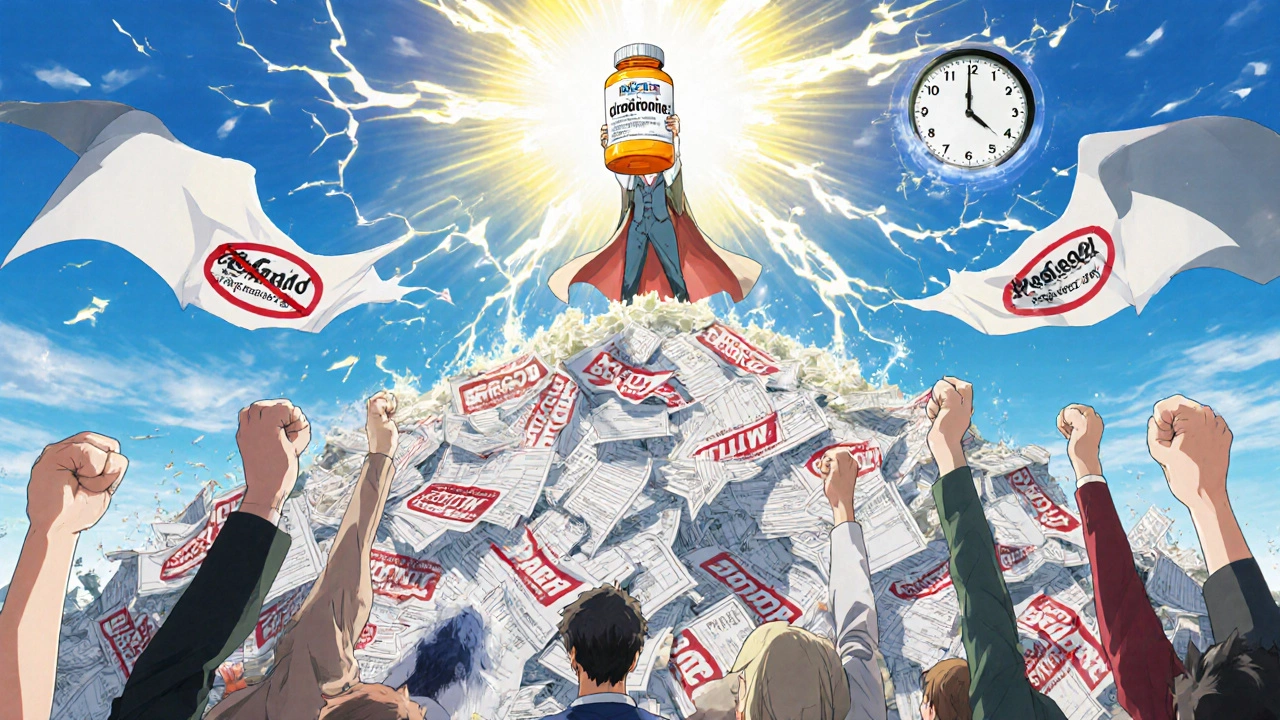When your doctor prescribes a brand-name medication and your insurance says no, it’s not just a paperwork issue-it’s a health risk. You might be on a drug that works, and switching to a generic could mean more seizures, worse pain, or dangerous side effects. Insurance companies deny these prescriptions all the time, often because they’re trying to cut costs, not because it’s medically unsafe. But you’re not powerless. You have rights, and you can win this fight-if you know how.
Why Your Insurance Denied Your Brand-Name Drug
Most denials happen because your plan’s formulary doesn’t include the drug, or they say a cheaper generic is "just as good." But that’s not always true. For some people, generics don’t work. Maybe you’ve tried them before and had bad reactions. Maybe your condition is too sensitive-like type 1 diabetes, epilepsy, or autoimmune disorders-where even tiny differences in absorption can be dangerous. Insurers know this, but they still push generics unless you push back hard. According to CMS data from 2022, nearly 63% of prior authorization denials for specialty drugs are for brand-name medications. That’s not random. It’s policy. Insurance plans change formularies without warning, and suddenly, your stable medication is off coverage. If you’ve been on it for years, you’re not the problem-the system is.What You Need Before You Appeal
You can’t just call and ask for a reconsideration. You need proof. The first thing you need is your Explanation of Benefits (EOB). Your insurer must send this within 5 business days of denying the claim. Read it carefully. It will say exactly why they denied it: "Generic available," "Prior authorization not met," or "Not medically necessary." Write down that reason. You’ll need it later. Next, call your doctor’s office. Ask for a letter of medical necessity. This isn’t a form letter. It needs to be detailed. Your doctor should include:- Your diagnosis and how the brand-name drug treats it
- Specific failures with generic alternatives (e.g., "Patient experienced three hypoglycemic episodes on generic insulin in the last 3 months")
- Lab results, dosage history, or clinical notes that prove the brand drug is essential
- How the drug impacts your daily life-can you work? Sleep? Care for your kids?
- Any relevant ICD-10 or CPT codes
How to File the Internal Appeal
Once you have your letter, it’s time to file your formal appeal. This is your first step inside the insurance company’s system. You have up to 180 days from the denial date to file, but don’t wait. The sooner you start, the faster you get results. Your appeal letter should include:- Your full name, date of birth, insurance ID number
- Claim or prior authorization number from the EOB
- Exact reason for denial (copy and paste it)
- Attached letter of medical necessity
- Any supporting records: pharmacy logs, ER visits, specialist notes
- A clear request: "Approve coverage for [drug name] as prescribed by [doctor]"
Call Every Day
This isn’t optional. After you mail your appeal, start calling the insurance company daily. Ask for the case number. Ask who’s reviewing it. Ask for a timeline. Most people give up after two or three calls. But Kantor & Kantor’s data shows appeals with daily follow-up are processed 28% faster. If you’re told it’s "under review," ask: "What’s the next step? When will I hear back?" If they say "We’ll notify you," say: "I need a written response by [date]." Write down the name of every person you speak to. You’re not being pushy-you’re protecting your health.
What If They Say No Again?
If your internal appeal is denied, you move to the external review. This is where things get serious. This step is handled by an independent third party-not your insurer. And here’s the kicker: external reviews succeed 58% of the time for brand-name drug appeals, compared to just 39% for internal ones. Who handles your external review depends on your plan:- For ERISA plans (about 61% of employer-based insurance): Contact the U.S. Department of Health and Human Services
- For state-regulated plans (Medicaid, individual market): Contact your state’s insurance commissioner
When to Hire a Lawyer
If your case involves an ERISA plan and you’ve been denied twice, it’s time to consider legal help. Kantor & Kantor, a law firm that’s handled insurance appeals since 1985, found that appeals drafted by attorneys have a 47% higher success rate than those filed by patients alone. Why? Because insurers use legal language to bury claims. They cite obscure policy clauses. They misinterpret guidelines. An attorney knows how to counter that. They also know how to force the insurer to produce internal documents showing how they make these decisions. You don’t need to sue right away. Many attorneys offer free consultations and will help you draft the external review letter for a flat fee. Some even work on contingency-only paid if you win.Urgent Cases: Get Help Fast
If you’re running out of medication and your life is at risk-like insulin, seizure meds, or immunosuppressants-you can request an expedited review. You don’t need to wait 30 days. Federal rules say insurers must respond within 4 business days. Call your insurer and say: "I am requesting an expedited appeal because my condition is life-threatening. I am at risk of [seizures, hospitalization, diabetic ketoacidosis]." Then follow up with a letter. Include your doctor’s statement that delay could cause serious harm. In these cases, success rates jump to 72%. Insurers know they can’t risk a death on their record.
What to Do While You Wait
Appeals take time. Don’t stop taking your meds. If you’re running low, ask your doctor about patient assistance programs. Eli Lilly’s Insulin Value Program, for example, has helped over 1.2 million people get brand-name insulin while appeals are pending. Many drugmakers have similar programs. Also, check if your pharmacy offers a bridge program. Some give 30-day supplies at low cost while you fight the denial.What’s Changing in 2025
The rules are slowly getting better. The 2023 Consolidated Appropriations Act now requires Medicare Part D plans to show real-time coverage info before you even fill a prescription. That’s cutting denial rates by 15-20%. The Biden administration’s 2023 executive order is pushing CMS to enforce appeal rights harder. And new quality metrics from the National Committee for Quality Assurance are now tracking how fast insurers respond. Plans that drag their feet could lose money. But don’t wait for the system to fix itself. Right now, physicians spend over 13 hours a week just managing prior authorizations. You’re not the only one fighting. But you’re the only one who can fight for you.Real Stories, Real Wins
One father in Ohio got his child’s Humalog insulin approved after 11 days by submitting a letter that listed every hypoglycemic episode in the past year. Another patient in Texas spent six months fighting a denial for a brand-name migraine drug. They lost twice-until they hired a lawyer. The third appeal was approved. These aren’t rare. They’re common. But only if you act.What if my insurance says the generic is just as good?
Insurers often claim generics are equivalent, but that’s not always true. For some conditions-like epilepsy, thyroid disorders, or type 1 diabetes-even small differences in absorption can cause serious side effects. Your doctor’s letter must document specific failures with generics, not just say "the brand works better." Use numbers: "Patient had 4 seizures in 3 months on generic, zero on brand." Evidence beats assumptions.
Can I appeal if I’m on Medicare?
Yes. Medicare Part D plans must follow federal appeal rules. You have 60 days to file an internal appeal and another 60 days for external review. Medicare Advantage plans have the same rights. The process is similar to private insurance, but you’ll contact Medicare directly, not your state insurance commissioner. Use the Medicare website or call 1-800-MEDICARE to start.
How long does an appeal take?
Internal appeals take 30 days for new prescriptions and 60 days for ongoing ones. External reviews take 30-60 days. For urgent cases, insurers must respond in 4 business days. If they miss deadlines, you can escalate to state or federal regulators. Always keep a log of dates and names.
What if I can’t afford the medication while waiting?
Many drug manufacturers offer free or low-cost programs for patients in need. Eli Lilly, Novo Nordisk, and Sanofi all have insulin assistance programs. Nonprofits like NeedyMeds and Patient Advocate Foundation can help you apply. Your pharmacist may also have samples or short-term bridge programs. Don’t skip doses-reach out for help now.
Do I need a lawyer to win?
Not always, but if you’re dealing with an ERISA plan and you’ve been denied twice, a lawyer increases your chances by nearly 50%. They know how to uncover hidden insurer policies and force them to justify denials. For non-ERISA plans, you can often win without one-but legal help still helps. Many attorneys offer free initial reviews.
Next Steps
If you’re facing a denial today:- Get your EOB and write down the denial reason
- Call your doctor’s office and ask for a letter of medical necessity
- Write your appeal letter using the structure above
- Send it by certified mail
- Call the insurer every day until you get a response
- If denied, request external review within 60 days
- If it’s life-threatening, ask for expedited review immediately




satya pradeep
November 18, 2025 at 04:07Bro this post is fire. I got denied for my epilepsy med last year and thought I was screwed. Used the letter thing - doctor literally listed every seizure I had on generic. 3 weeks later they approved it. Insurers are just profit machines. Don’t let them gaslight you.
Prem Hungry
November 18, 2025 at 09:08Respected Sir/Ma'am, I wish to express my profound gratitude for this meticulously structured guide. The procedural clarity provided herein is of immense utility to those navigating the labyrinthine bureaucracy of pharmaceutical coverage. One must, however, remain vigilant against systemic malfeasance.
Leslie Douglas-Churchwell
November 19, 2025 at 13:46Let’s be real - this isn’t about ‘medical necessity.’ It’s Big Pharma paying insurers to keep brand names on formularies. 🤫💰 I’ve seen the internal memos. They track how many patients switch after 6 months. It’s a rigged game. And your ‘doctor’s letter’? Just a placebo for your hope. 🧪💔
shubham seth
November 21, 2025 at 04:42Insurance companies are basically vampires with HR departments. They don’t care if you die - they care if your death makes their quarterly report look ugly. That ‘prior auth’ form? It’s a death sentence written in Comic Sans. And yeah, your doctor’s letter? It’s the only thing standing between you and a slow, bureaucratic murder.
Kathryn Ware
November 22, 2025 at 19:44This is so important!! 🙌 I’ve helped 3 friends navigate this exact process - one was on insulin, another on a biologic for lupus. The letter of medical necessity is EVERYTHING. And calling daily? YES. I had one friend who called at 7am, 12pm, and 5pm every day for 11 days. They finally caved. Also - patient assistance programs are GOLD. I’ll DM you links if you need help applying 😊
kora ortiz
November 24, 2025 at 08:23You got this. No excuses. Get the letter. Mail it certified. Call every day. If they say no, go external. If you’re running out - demand expedited. This isn’t optional. Your life is on the line. Do it. Now.
Jeremy Hernandez
November 25, 2025 at 22:33Wow another ‘you can beat the system’ fairy tale. Newsflash - you can’t. They’ve got lawyers, algorithms, and a billion-dollar budget to deny you. Your ‘letter’? It’s a receipt for their next coffee. Save your energy. Just switch to the generic and pray.
Tarryne Rolle
November 27, 2025 at 11:02Is the real issue here not that we’ve allowed healthcare to become a transactional commodity? We’ve outsourced compassion to shareholders. The ‘appeal’ is just a performance of agency - a theater of resistance in a system designed to make you feel powerless so you don’t revolt. The drug works? Good. The system doesn’t care. It’s not broken - it’s working exactly as intended.
Kyle Swatt
November 28, 2025 at 11:47I’ve been on the same brand-name med for 12 years. Got denied twice. First time I cried. Second time I mailed the letter with a photo of my kid holding my prescription bottle. They approved it. Not because of the ICD codes - because they saw a human. This isn’t about bureaucracy. It’s about remembering that behind every denial is someone’s heartbeat. Don’t stop fighting. Even if it’s just for the person you love.
Deb McLachlin
November 28, 2025 at 20:19Thank you for this comprehensive overview. I am particularly interested in the jurisdictional distinctions between ERISA and state-regulated plans. Could you clarify whether the external review process for Medicare Advantage plans is governed by the same federal timelines as private insurers? I ask because my sister’s plan is under Humana, and we are currently navigating this process.
saurabh lamba
November 29, 2025 at 11:14Why bother? The system wins. Always. 🤷♂️ I tried. Got denied. Paid out of pocket for 3 months. Now I’m broke and still on the drug. Just accept it. Life’s unfair. Also, emojis are dumb.
Sridhar Suvarna
December 1, 2025 at 03:23This is the kind of guide that saves lives. I’ve been a caregiver for my mother with MS for 8 years. We’ve won every appeal - not because we’re lucky, but because we followed every step. Call every day. Document everything. And never, ever let them tell you ‘it’s just a generic.’ Your mom’s tremors don’t care about cost savings. Neither should you.
Joseph Peel
December 2, 2025 at 02:54Excellent breakdown. I work in global health policy and can confirm: the U.S. is an outlier in how aggressively insurers suppress brand-name access. In Canada and Germany, prior authorization exists but is rarely used for life-sustaining drugs. The profit motive here is pathological. This guide is a small act of resistance.
Kelsey Robertson
December 2, 2025 at 22:18Wait… so you’re telling me that insurance companies are… *gasp*… prioritizing profits over human life?!?!?!?!!! I’m shocked. Shocked, I tell you. 🤯 And people say I’m the paranoid one…